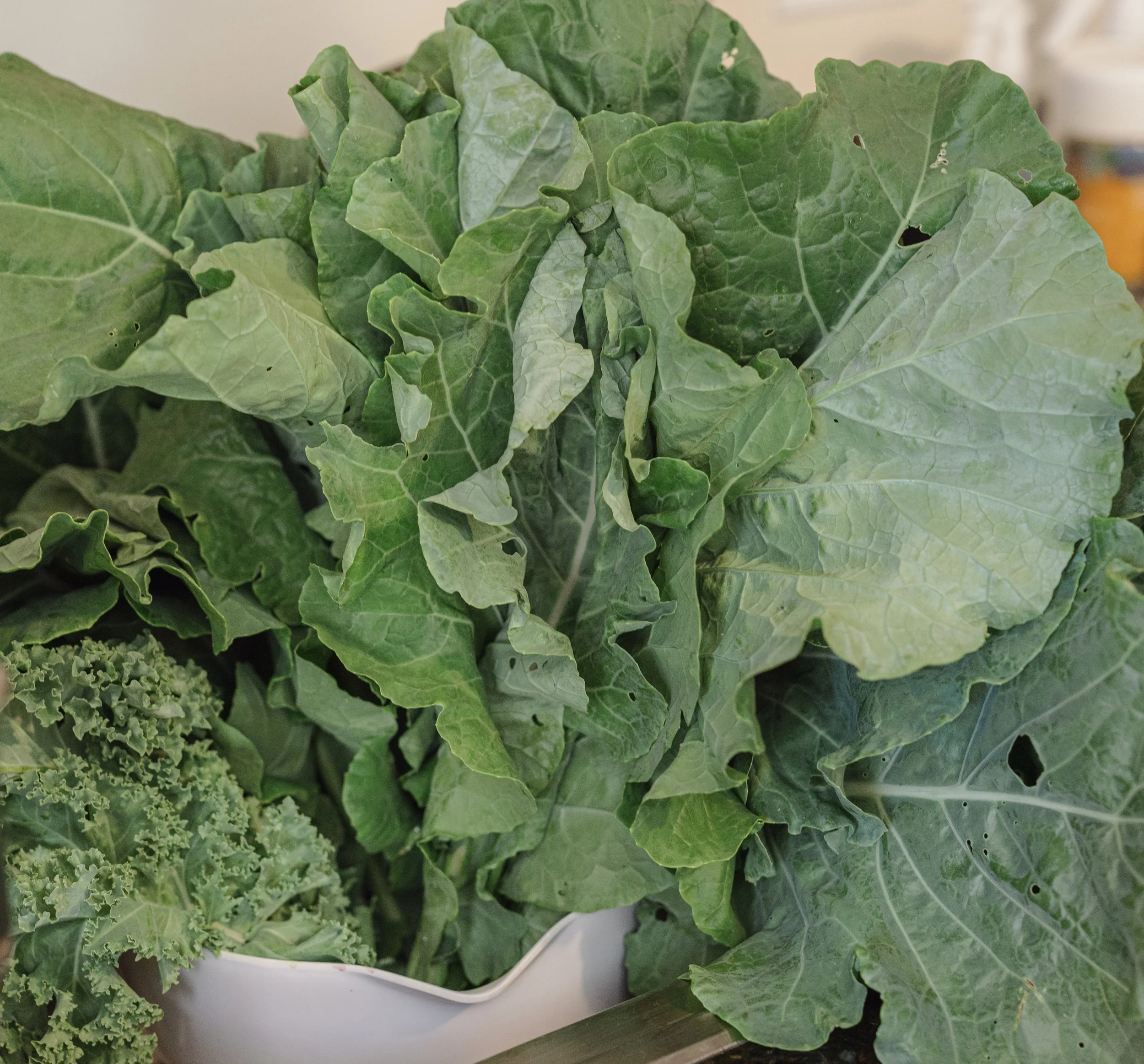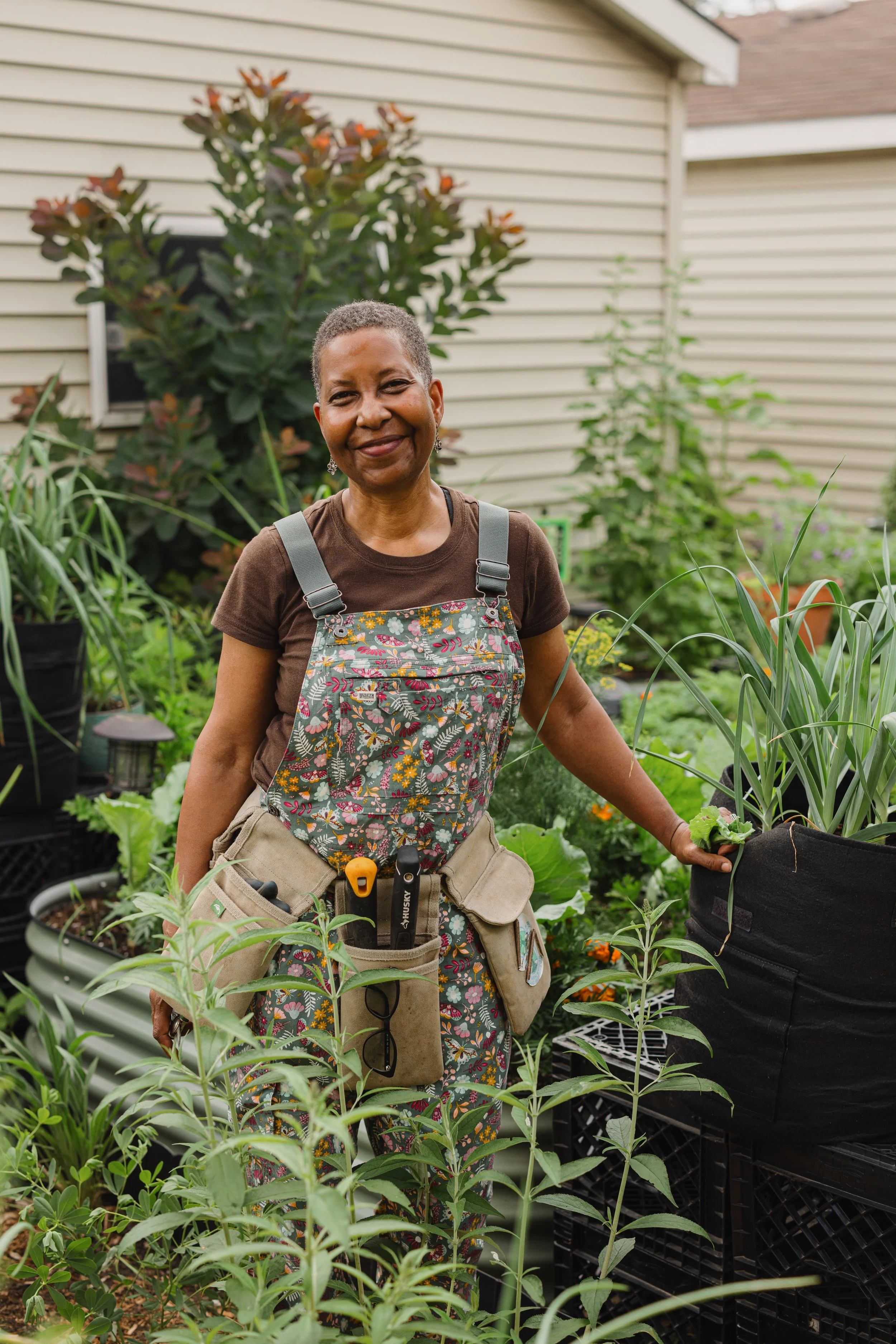GOOD DIGESTION - IT’S NOT JUST ABOUT FOOD
Mindful Consumption of Food, Emotions and Information
When we think about digestion, we usually picture our stomachs breaking down a hearty meal or the importance of fiber and probiotics. While these are essential, digestion goes far beyond the physical. Every day, we “digest” not only food but also information, emotions, experiences, relationships, and environmental stimuli. Just like our bodies process nutrients and discard waste, our minds and hearts also need to process what they’re exposed to - and let go of what doesn’t nourish us.
Understanding digestion as a whole-body, whole-life process is key to better health, clarity, and resilience.
And hang in there for one of my favorite recipes for collard greens!
The Physical: Supporting Healthy Food Digestion
Let’s start with the basics - your actual digestive system. During digestion, the body breaks down food into smaller components—such as carbohydrates into sugars, proteins into amino acids, and fats into fatty acids—so they can be absorbed and used for energy, growth, and repair. This process begins in the mouth with chewing and saliva, continues in the stomach where food is mixed with acids and enzymes, and finishes in the small intestine where most nutrients are absorbed into the bloodstream.
Good digestion is essential because it directly impacts how well your body can access the nutrients it needs to function properly. When digestion is efficient, your body has the fuel it needs for energy, a strong immune system, mental clarity, and balanced hormones. Poor digestion, on the other hand, can lead to nutrient deficiencies, fatigue, bloating, and more serious health issues over time. Supporting your digestive health through a balanced diet, hydration, and mindful eating habits is a foundational step toward overall well-being.
Here are several foundational tips to support good digestion:
Eat mindfully - Sit down, slow down, and chew thoroughly. Mindful eating supports enzymatic activity and helps your body recognize when it’s full.
Stay hydrated - Water is essential for moving food through your digestive tract and preventing constipation.
Feed your gut microbiome - Include fiber-rich foods (vegetables, fruits, whole grains), fermented foods (yogurt (with minimal sugar), kefir, sauerkraut (my favorite), and prebiotics (onions, garlic, bananas) to support the good bacteria that aid digestion and immunity.
Don’t overeat - Your digestive system works best when it’s not overwhelmed. Smaller, balanced meals are often easier to digest than heavy, irregular ones.
Move your body - Gentle movement like walking after meals can improve digestion and prevent sluggishness or bloating.
Manage stress - Stress directly affects digestion by triggering the “fight or flight” response, which shuts down digestive processes. Deep breathing, meditation, or spending time in nature can help. If you’d like to learn more about the connection between stress and digestion, check out my blog post, KEEP STRESS OFF YOUR PLATE.
The Mental-Emotional: What Else Are You Digesting?
Being mindful about what you are digesting - beyond just food - means being intentional about the information, media, conversations, and environments you allow into your mental and emotional space. In a world saturated with constant stimulation, taking time to filter what you consume can help reduce stress, anxiety, and mental fatigue. Whether it’s avoiding toxic news cycles, limiting time on social media, or being selective about the people you engage with, mindful consumption helps protect your energy and promotes mental clarity. It fosters a sense of control over your internal world, allowing you to stay grounded in your values and better navigate external chaos.
Moveover, this kind of mindfulness supports emotional well-being and personal growth. The stories, opinions, and content we absorb can subtly shape our beliefs, self-image, and mood. By curating what we allow into our minds - choosing uplifting, educational, or meaningful material - we create a healtheir internal dialogue and open space for reflection and creativity. Mindful mental digestion encourages deeper connection to ourselves and the world around us, helping us respond rather than react and build more purposeful lives.
Here are a few ways to maintain balance:
*Filter your inputs
-Limit media exposure - Choose one or two trusted news sources and check them at set times rather than letting a 24/7 stream flood your mind.
-Curate your digital diet - Unfollow or mute accounts that bring stress, comparison, or distraction into your life. Maybe just follow those that uplift or educate you.
*Practice emotional digestion
-Feel your feelings - Avoiding emotions doesn’t make them go away. Journaling, talking to a friend or therapist, or simply naming what you’re feeling helps you “digest” experiences instead of storing them in your body.
-Allow rest - Just like the body needs time between meals, your nervous system needs breaks between stressors. Make time for stillness or creative flow.
*Be intentional with relationships
-Notice how you feel after spending time with someone - Energized? Drained? Seen? Dismissed? That’s your emotional digestive system talking.
-Set boundaries - You don’t have to take in everything others throw your way. Learn to say no, excuse yourself, or create space from toxic or one-sided relationships.
Digestive Health as a Mirror of Life Balance
When your digestion is off - whether physically or emotionally - it’s often a sign that something is out of balance. Maybe you’re eating too fast, consuming too much news, neglecting rest, or tolerating relationships that take more than they give. Just like your body lets you know when food doesn’t sit right, your mind and spirit will signal when life is hard to “digest.”
Start paying attention to what you take in, not just through your mouth, but through your eyes, ears, heart, and energy. Ask yourself:
Is this nourishing?
Do I need this right now?
What am I holding onto that I can release?
Final Thoughts: Conscious Consumption = Better Digestion
In the same way that healthy digestion helps your body absorb nutrients and eliminate toxins, conscious living helps your mind and heart stay clear, energized, and whole. You don’t have to take in everything you’re offered - whether it’s fast food or fast news. Give yourself permission to be selecgive about what you consume in every area of life.
True wellness begins not just with what we eat, but with what we allow in - and what we consciously choose to let go.
Collards Stuffed with Kenyan Red Beans
Just like my cucumbers, I’ve enjoyed a bumper crop of collard greens this year. This photo is from a July harvest from Reed’s Garden, my micro-farm. Collard greens are nutrient-rich, packed with vitamins A, C, and K, folate, calcium, and fiber, which contribute to strong bones, a healthy immune system, and good vision. Additionally, they may help reduce the risk of certain cancers, improve heart health, and support healthy digestion. And it’s super-easy to blanch and freeze collard greens to enjoy later in the fall and winter and you’re looking to add some summer goodness to a stew or stir-fry.
Collards Stuffed with Kenyan Red Beans (Makes 8 rolls)
Ingredients:
8 whole collard greens, stems removed
2 Tbs. coconut oil
1 medium yellow onion, diced
1 green bell pepper, diced
1 tsp. curry powder
1/4 tsp. ground cumin
1/4 tsp. ground cardamom
1/4 tsp. turmeric
1/4 tsp. white pepper (or black pepper)
1 medium Thai chile pepper, seeded and minced
1 15-oz can red kidney beans, rinsed and drained
1/2 cup coconut milk
1 medium Roma tomato, seeded and diced
4 cloves garlic, minced (4 tsp.)
1/2 cup chopped cilantro
2 tsp. honey
Instructions:
Bring large pot of lightly salted water to a boil. Drop collard leaves into water, and cook about 5 minutes, until pliable. (Cook extra leaves, if desired, in case 1 or 2 tear during rolling.) Remove from water with tongs, and drop into ice water to stop cooking. Drain leaves and thoroughly pat dry with paper towels. Set aside.
Heat oil in medium saucepan over medium heat; sauté onion and bell pepper until just tender, 4 to 6 minutes. Stir in curry, cumin, cardamom, turmeric, white (or black) pepper, and chile pepper, and cook 1 minute more. Stir in beans, coconut milks, tomato, and garlic. Bring to a boil, reduce heat, adn cook over medium-low heat, uncovered, 7 to 10 minutes, until liquid has cooked off and beans are soft. Stir in cilantro and honey, and let mixture cool.
Place 1 collard leaf on flat surface. Place 1/4 cup bean mixture onto lower third of leaf. Fold bottom edge of leaf over mixture, breaking rib if necessary to ease folding. Fold sides of leaves in to cover mixture. Starting at bottom edge, roll leaf tightly to encase filing completely. Arrange seam-side down on serving plate. Repeat with remaining leaves, and serve immediately.
These rolls are easy to pack and take to work or keep in a lunch pack when you’re out-and-about.
Marguerite’s Version
Same as above, AND: I usually don’t take time to seed the tomato(s). Not necessary in my opinion. It make take longer than the recipe says for the liquid to cook off. You don’t want the filing to be to liquidy when you’re ready to stuff the collard leaves. Make sure to let the filling cool and thicken a bit before stuffing the collard leaves. And you don’t want to stuff them too much or the leaves will surely tear. Not the end of the world, but not as pretty when you lay them out on a plate for serving. If you can’t lay your hands on chile peppers, you can always add cayenne pepper or just skip the “hot” altogether. And you may want to double the filling and save some to eat as a side dish, especially if you like beans. And if you prefer black beans, go for it. I sometimes switch between red and black beans.
For more health and wellness tips and information about upcoming Nature and Forest Therapy Walks and the Seed Keepers Group Coaching Program for Women, please visit www.inhalene.com. And don’t forget to Subscribe to receive future Seeds of Wellness Newsletters.
Yours in wellness,
Marguerite
Inhalene Health & Wellness Coaching




